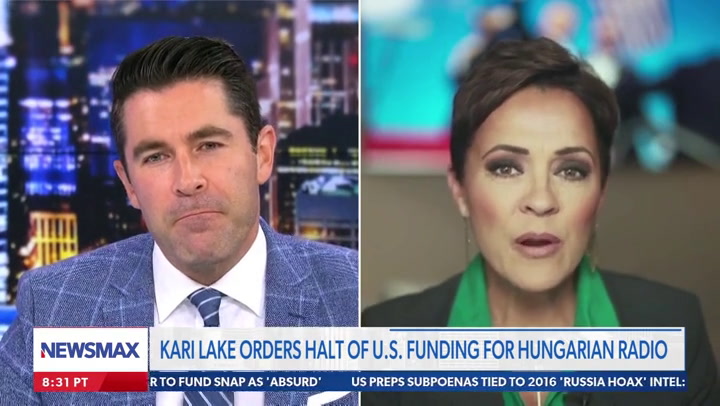Listen to the article
In a move that has raised concerns about press freedom and U.S. foreign policy priorities, the U.S. Agency for Global Media announced it will terminate funding for Radio Free Europe’s Hungarian service, citing the station’s critical reporting on Hungarian Prime Minister Viktor Orbán, a close ally of former President Donald Trump.
Kari Lake, the acting head of the agency and a prominent supporter of Trump, informed Congress of the decision in a letter to Republican Representative Mario Diaz-Balart of Florida. Lake explicitly stated that the funding withdrawal was necessary because the station’s “programming has undermined President Trump’s foreign policy by opposing the duly elected prime minister Viktor Orbán.”
The decision marks a significant shift in U.S. government media policy and has sent ripples through international broadcasting circles. Radio Free Europe/Radio Liberty (RFE/RL) has historically operated as an independent news organization funded by the U.S. government to provide objective reporting in regions where press freedom is restricted.
Hungary’s media landscape has changed dramatically under Orbán’s leadership, with press freedom organizations documenting a systematic consolidation of media ownership among government allies. The country has fallen significantly in international press freedom rankings over the past decade, with Reporters Without Borders placing it 69th out of 180 countries in its 2023 World Press Index.
The Hungarian service of RFE/RL was relaunched in 2020 after a nearly three-decade hiatus, specifically in response to concerns about declining media independence in the country. Its reporting has frequently highlighted corruption allegations, democratic backsliding, and Hungary’s increasingly close ties with Russia and China.
Lake, who unsuccessfully ran for governor of Arizona in 2022 and gained national attention for refusing to concede her loss, has been a vocal supporter of Trump’s claims about the 2020 presidential election. Her appointment to lead the U.S. Agency for Global Media raised eyebrows among media watchdogs given her lack of experience in international broadcasting.
The agency oversees several U.S. government-funded media outlets, including Voice of America, Radio Free Europe/Radio Liberty, and Radio Free Asia, which collectively reach millions of people worldwide with news programming in dozens of languages.
Critics of the decision have characterized it as an alarming politicization of what are supposed to be independent journalistic organizations. Former agency officials have expressed concern that the move signals a broader intention to transform U.S. government media outlets into vehicles for partisan foreign policy rather than sources of factual reporting.
Media freedom advocates point out that Orbán, who has described his vision for Hungary as an “illiberal democracy,” has found an ideological ally in Trump. The Hungarian leader was one of the first European heads of state to congratulate Trump on his election victory and has been invited to the White House early in the new administration.
The decision also comes amid broader concerns about the future direction of U.S. foreign policy toward European allies. Hungary has frequently broken with European Union consensus on issues ranging from support for Ukraine to relations with China, positions that have aligned more closely with Trump’s stated policy preferences.
Congressional Democrats have signaled they may investigate the decision, questioning whether it represents inappropriate political interference in journalistic operations. Several have pointed to legislation that established a firewall intended to protect the editorial independence of U.S. government-funded media from political influence.
As the situation develops, questions remain about how this decision will affect other U.S. government media operations worldwide and what it signals about the administration’s approach to press freedom both domestically and internationally.
Fact Checker
Verify the accuracy of this article using The Disinformation Commission analysis and real-time sources.




11 Comments
This is a concerning development for press freedom and the credibility of U.S. government-funded media. Targeting VOA for criticizing a political ally undermines its role as an independent source of information.
I agree, this decision risks damaging VOA’s reputation as an objective and trustworthy news source. Protecting the independence of U.S. international broadcasting should be a priority.
It’s worrying to see Voice of America’s funding targeted for criticizing a political ally. Maintaining the independence of U.S. government-funded media outlets is crucial, even when they report unfavorably on foreign leaders.
Absolutely. Objective reporting and press freedom should be the priority, not political allegiances. This sets a dangerous precedent that could undermine VOA’s credibility and mission.
This is a concerning development for press freedom and objective reporting. Voice of America has long played an important role in countering disinformation, even during the Cold War. Targeting it for political reasons sets a troubling precedent.
I agree, independent and impartial journalism should be protected, not undermined for political gain. This decision seems to undermine U.S. foreign policy principles.
Terminating funding for VOA’s Hungarian service over critical reporting on Orbán is a troubling step. It seems to prioritize political loyalty over the core purpose of providing factual, independent news coverage.
Cutting funding for VOA’s Hungarian service over critical reporting on Orbán is a concerning development. It undermines the mission of providing factual, independent news coverage, which should be the top priority.
The decision to cut VOA’s Hungarian funding over critical reporting on Orbán is deeply problematic. It seems to prioritize political allegiances over the principles of press freedom and independent journalism that VOA was founded on.
This is a troubling move that appears to compromise the independence and credibility of VOA. Objective reporting should be the priority, not punishing outlets for criticizing political allies.
Absolutely. Maintaining the integrity of U.S. government-funded media like VOA is crucial, even when they report unfavorably on foreign leaders. This sets a worrying precedent.